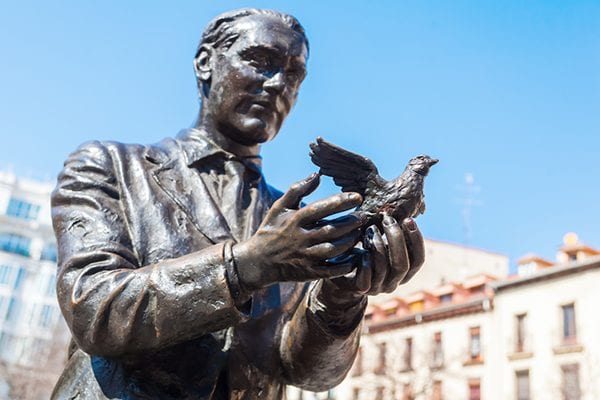Favourite poet: Federico Garcia Lorca
Favourite poet: Federico Garcia Lorca
Favourite poet: Federico Garcia Lorca
-
Hannah
-
Hannah

My latest novel, Indiscretion, is set in Andalusia, Spain, in the 1950s. There, the Spaniards live still under the long shadow cast by the civil war from 1936 to 1939, and under the control of the dictator Franco. I characterise it in the book as a conservative country, not to mention one still broken and impoverished by the war.
Reading up on the background of the era was fascinating; I have always loved history. Of course, being a writer and an ardent art lover, I gravitate towards cultural history. Writers, artists, musicians, dramatists – they give a feel for a time and place beyond that which you find in a history book. I took this opportunity to learn more about one of my favourite Spanish poets, Federico Garcia Lorca, whose words stand as the epigraph for Indiscretion:
To burn with desire and keep quiet about it is the greatest punishment we can bring on ourselves.
Garcia Lorcawas born in 1898 in Fuente Vaqueros, and when he reached adulthood he attended university in Granada, studying law, literature and composition. He was particularly drawn to the theatre and music, and was a gifted classical pianist, and his first writings drew on musical forms.
In 1918 he published his first book, Impresiones y Paisajes (Impressions and Landscapes), inspired by his travels around Castile, León and Galicia, and he was invited to enrol at the Residencia de Estudiantes in Madrid, a prestigious cultural institution set up to nurture the talent of young thinkers, writers and artists. There, Garcia Lorcaworked on playwriting and poetry alongside brilliant creative minds like Salvador Dalí (for whom he developed an unrequited love) and he became a core member of the Generación del 27(Generation of 27), a group of poets exploring avant-garde forms of art and poetry.
If only Garcia Lorcawere remembered for his long list of important and inspiring works. But the manner of his death is tied up with his remembrance. He was arrested right before the outbreak of the civil war in 1936 for his outspoken socialist views and shot dead by Nationalist militia. His remains were never recovered, but various memorials have been established in Spain, including a statue in the Plaza de Santa Ana in Madrid (pictured) and a park, the Parque Federico Garcia Lorca, in Granada where each year a poetry reading is held to mark the anniversary of his death.
Following his assassination, Franco’s regime placed a ban on Garcia Lorca’s work, which was not lifted until 1953. To me and countless others, that makes his works which we may now read all the more precious. I will leave you with my favourite poem from his collection, which is called ‘Romance Sonambulo’ – ‘Sleepingwalking Ballad’. It is beautiful in the English, but even more so in its original Spanish (‘Verde que te quiero verde’); you can find the Spanish poem here.
Green, how I want you green.
Green wind. Green branches.
The ship out on the sea
and the horse on the mountain.
With the shade around her waist
she dreams on her balcony,
green flesh, her hair green,
with eyes of cold silver.
Green, how I want you green.
Under the gypsy moon,
all things are watching her
and she cannot see them.
Green, how I want you green.
Big hoarfrost stars
come with the fish of shadow
that opens the road of dawn.
The fig tree rubs its wind
with the sandpaper of its branches,
and the forest, cunning cat,
bristles its brittle fibers.
But who will come? And from where?
She is still on her balcony
green flesh, her hair green,
dreaming in the bitter sea.
– My friend, I want to trade
my horse for her house,
my saddle for her mirror,
my knife for her blanket.
My friend, I come bleeding
from the gates of Cabra.
– If it were possible, my boy,
I’d help you fix that trade.
But now I am not I,
nor is my house now my house.
– My friend, I want to die
decently in my bed.
Of iron, if that’s possible,
with blankets of fine chambray.
Don’t you see the wound I have
from my chest up to my throat?
– Your white shirt has grown
thirsty dark brown roses.
Your blood oozes and flees a
round the corners of your sash.
But now I am not I,
nor is my house now my house.
– Let me climb up, at least,
up to the high balconies;
Let me climb up! Let me,
up to the green balconies.
Railings of the moon
through which the water rumbles.
Now the two friends climb up,
up to the high balconies.
Leaving a trail of blood.
Leaving a trail of teardrops.
Tin bell vines
were trembling on the roofs.
A thousand crystal tambourines
struck at the dawn light.
Green, how I want you green,
green wind, green branches.
The two friends climbed up.
The stiff wind left
in their mouths, a strange taste
of bile, of mint, and of basil
My friend, where is she – tell me –
where is your bitter girl?
How many times she waited for you!
How many times would she wait for you,
cool face, black hair,
on this green balcony!
Over the mouth of the cistern
the gypsy girl was swinging,
green flesh, her hair green,
with eyes of cold silver.
An icicle of moon
holds her up above the water.
The night became intimate
like a little plaza.
Drunken ‘Guardias Civiles’
were pounding on the door.
Green, how I want you green.
Green wind. Green branches.
The ship out on the sea.
And the horse on the mountain.